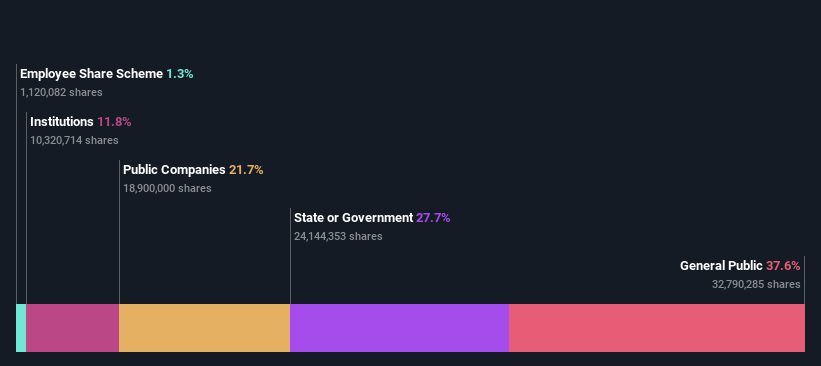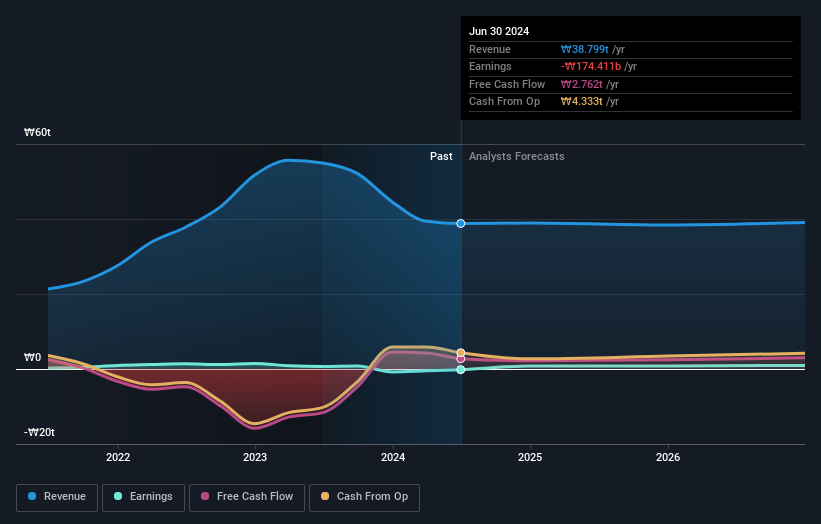Korea Gas Corporation's (KRX:036460) stock price dropped 7.2% last week; individual investors would not be happy
Key Insights
- The considerable ownership by individual investors in Korea Gas indicates that they collectively have a greater say in management and business strategy
- A total of 3 investors have a majority stake in the company with 57% ownership
- Institutions own 12% of Korea Gas
A look at the shareholders of Korea Gas Corporation (KRX:036460) can tell us which group is most powerful. The group holding the most number of shares in the company, around 38% to be precise, is individual investors. Put another way, the group faces the maximum upside potential (or downside risk).
As market cap fell to ₩3.6t last week, individual investors would have faced the highest losses than any other shareholder groups of the company.
Let's take a closer look to see what the different types of shareholders can tell us about Korea Gas.
View our latest analysis for Korea Gas

What Does The Institutional Ownership Tell Us About Korea Gas?
Institutions typically measure themselves against a benchmark when reporting to their own investors, so they often become more enthusiastic about a stock once it's included in a major index. We would expect most companies to have some institutions on the register, especially if they are growing.
As you can see, institutional investors have a fair amount of stake in Korea Gas. This suggests some credibility amongst professional investors. But we can't rely on that fact alone since institutions make bad investments sometimes, just like everyone does. When multiple institutions own a stock, there's always a risk that they are in a 'crowded trade'. When such a trade goes wrong, multiple parties may compete to sell stock fast. This risk is higher in a company without a history of growth. You can see Korea Gas' historic earnings and revenue below, but keep in mind there's always more to the story.

Korea Gas is not owned by hedge funds. Looking at our data, we can see that the largest shareholder is The Republic of Korea with 28% of shares outstanding. For context, the second largest shareholder holds about 22% of the shares outstanding, followed by an ownership of 8.1% by the third-largest shareholder.
After doing some more digging, we found that the top 3 shareholders collectively control more than half of the company's shares, implying that they have considerable power to influence the company's decisions.
While studying institutional ownership for a company can add value to your research, it is also a good practice to research analyst recommendations to get a deeper understand of a stock's expected performance. Quite a few analysts cover the stock, so you could look into forecast growth quite easily.
Insider Ownership Of Korea Gas
The definition of company insiders can be subjective and does vary between jurisdictions. Our data reflects individual insiders, capturing board members at the very least. The company management answer to the board and the latter should represent the interests of shareholders. Notably, sometimes top-level managers are on the board themselves.
Most consider insider ownership a positive because it can indicate the board is well aligned with other shareholders. However, on some occasions too much power is concentrated within this group.
Our data cannot confirm that board members are holding shares personally. Given we are not picking up on insider ownership, we may have missing data. Therefore, it would be interesting to assess the CEO compensation and tenure, here.
General Public Ownership
With a 38% ownership, the general public, mostly comprising of individual investors, have some degree of sway over Korea Gas. While this group can't necessarily call the shots, it can certainly have a real influence on how the company is run.
Public Company Ownership
Public companies currently own 22% of Korea Gas stock. We can't be certain but it is quite possible this is a strategic stake. The businesses may be similar, or work together.
Next Steps:
It's always worth thinking about the different groups who own shares in a company. But to understand Korea Gas better, we need to consider many other factors. Be aware that Korea Gas is showing 2 warning signs in our investment analysis , and 1 of those is concerning...
If you would prefer discover what analysts are predicting in terms of future growth, do not miss this free report on analyst forecasts.
NB: Figures in this article are calculated using data from the last twelve months, which refer to the 12-month period ending on the last date of the month the financial statement is dated. This may not be consistent with full year annual report figures.
Have feedback on this article? Concerned about the content? Get in touch with us directly. Alternatively, email editorial-team (at) simplywallst.com.
This article by Simply Wall St is general in nature. We provide commentary based on historical data and analyst forecasts only using an unbiased methodology and our articles are not intended to be financial advice. It does not constitute a recommendation to buy or sell any stock, and does not take account of your objectives, or your financial situation. We aim to bring you long-term focused analysis driven by fundamental data. Note that our analysis may not factor in the latest price-sensitive company announcements or qualitative material. Simply Wall St has no position in any stocks mentioned.
 Index Options
Index Options CME Group
CME Group Nasdaq
Nasdaq Cboe
Cboe TradingView
TradingView Wall Street Journal
Wall Street Journal